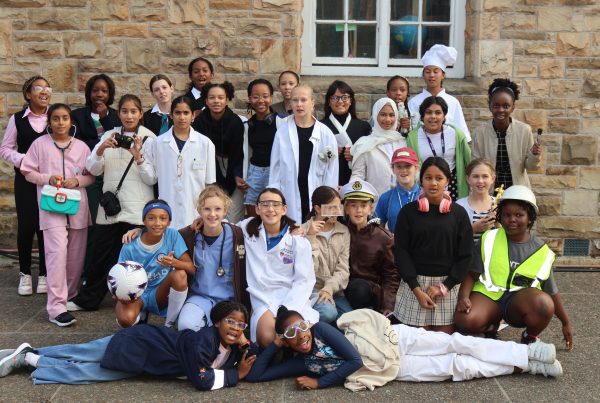Written by Mary Botha, Gr 7 A
In our fast-changing world, there is one thing that connects the people who are reading this newsletter: a shared interest in Education. No one in the school is more enthusiastic about Education and its possibilities than Mr Andrew Stamper, our deputy principal.
Sitting with Mr Stamper to discuss his thoughts on Education,he spoke enthusiastically about the upcoming technological trends that he sees emerging and his views on how we should cope with them.
“Children these days growing up have access to more content than we can ever create and it’s about helping them to utilise those skills so that they can think on their feet and be comfortable with change.”
“If we don’t change and if we’re not at the forefront of change then we’re going to be replaced by a computer. We must embrace the change and the challenges ahead of us,” he says. “Pretty much everybody in this country has some form of device. It’s about using the device that you have.“
Mr Stamper believes that the school curriculum needs to become more skills-based, arguing that “we need to teach kids how to adapt, problem-solve, think critically and work with people.”
“The move online has allowed children to find spaces and tools that might work best for them, it has allowed teachers to also explore areas and opportunities that they didn’t think were otherwise available, and also challenged teachers and schools to step out and realize that there are amazing opportunities out there.”
When asked about the recent rise of Artificial Intelligence (AI) and the popular ChatGPT tool, Mr Stamper’s enthusiasm increases still further. “I love ChatGPT! I don’t see huge dangers in it – I see a wonderful opportunity for teachers to help educate children to use it effectively.”
For all his interest in technology, though, it is clear that Mr Stamper values the human side of education.
“We need compassion – the world doesn’t have to be tough,” he said. “Imagine we created kind, loving, compassionate people (in our classrooms)? We wouldn’t deal with half the things we’re dealing with in the world today!”
This approach is also clear when Mary Botha ask Mr Stamper about what he would like to leave behind as he leaves teaching.
“I want to be remembered as a teacher who was there for the children as well as the staff, and one that fostered a love of learning and kindness with each other, and one that people were able to say ‘I felt I could be myself in Mr Stamper’s class’.”
We thank Mr Stamper for everything that he has brought to Rustenburg, and wish him and his family all of the best as he moves into an exciting new role – linked to technology! – in the private sector.




